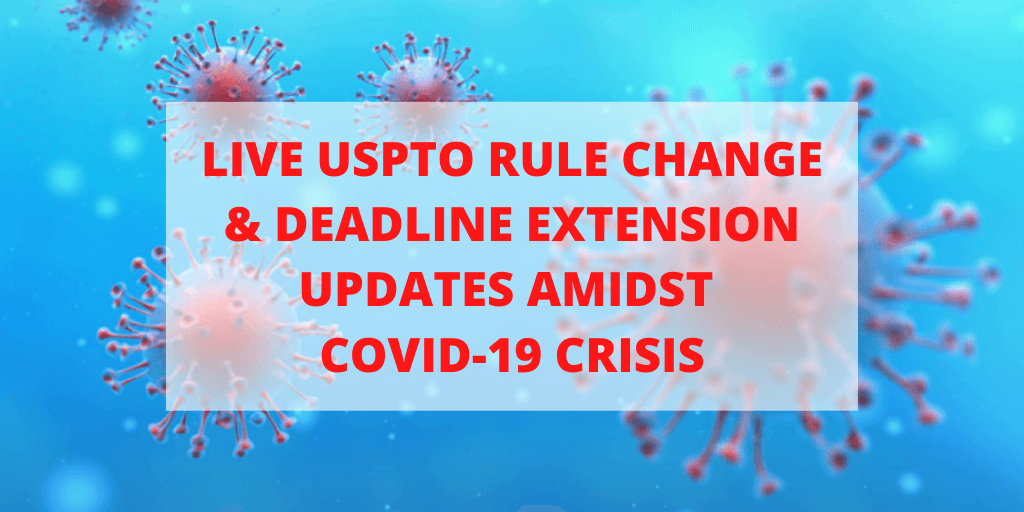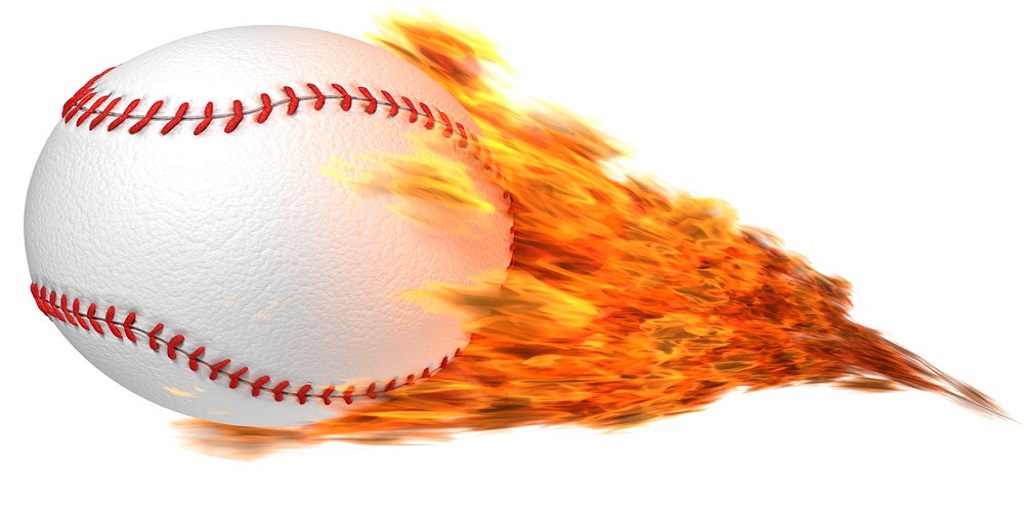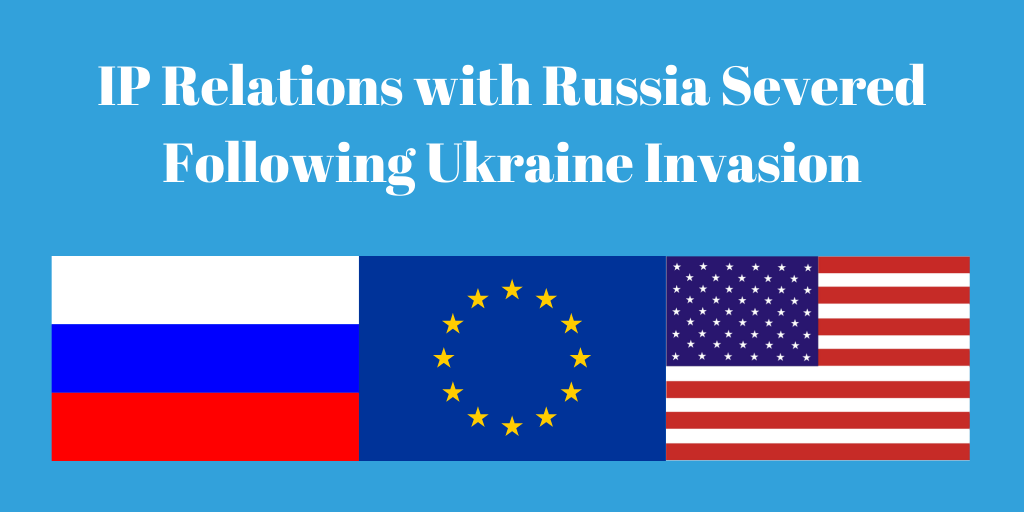It goes without saying that we live in an unprecedented time. With a majority of offices, stores, and schools across the country shuttered for months, the COVID-19 pandemic has brought normal life to a near standstill. Nevertheless, ingenuity never sleeps and the USPTO has rolled out plenty of emergency measures and rule changes to ensure innovation can continue in this trying time. In this article I present the many actions the USPTO has taken in response to the ongoing pandemic to ensure patents and trademarks can be filed in a relatively normal fashion.
On March 13th, the Office announced its first coronavirus-related rule change, suspending all in-person meetings and moving them to remote video conferences and telephone calls. According to the Office, affected meetings include “examiner and examining attorney interviews, Patent Trial and Appeal Board (PTAB) and Trademark Trial and Appeal Board (TTAB) oral hearings, and other similar in-person meetings with parties and stakeholders scheduled to take place at USPTO offices on or after Friday, March 13, 2020.” As of May 1st, there has been no update on when in-person meetings will resume.
On March 15th, the Office announced that all USPTO offices would be closed to the public until further notice starting March 16th. In the announcement the Office stated that offices would remain open for employees and contractors. At the time, there were no extensions made for patent or trademark application deadlines.
On March 16th, the Office waived petition fees “in certain situations” for persons “impacted by the coronavirus.” In the official notice, the USPTO stated it would waive fees for individuals who were unable to “timely reply to an Office communication due to the effects of the coronavirus outbreak” which resulted in the application being held “held abandoned or the reexamination prosecution terminated or limited.” In order to be eligible, the petitioner must include a statement in their filing indicating the delay in filing was due to the coronavirus outbreak. The petition must be filed “no later than two months of the issue date of the notice of abandonment or the notification that reexamination prosecution has been terminated.”
On March 19th, the Office waived the original handwritten signature requirement of 37 CFR 1.4(e)(1) and (2). Original handwritten signatures in ink are no longer required for “certain correspondence with the Office of Enrollment and Discipline” and “certain payments by credit card.” The USPTO justified both of the aforementioned rule waivings by declaring the pandemic an “extraordinary situation” within the meaning of 37 CFR 1.18 “Suspension of Rules.” It was the suspension of rules where it became evident the scale of the pandemic’s effects on inventors.
On March 31st, the USPTO announced it would extend certain patent and trademark-related deadlines. In an official notice, the Office announced most patent-related deadlines due between March 27th and April 30th would be extended by 30 days from the initial due date provided the filing is “accompanied by a statement that the delay in filing or payment was due to the COVID-19 outbreak.” This 30-day extension was also granted to trademark-related deadlines with the same conditions. The Office cited office closures, travel delays, personal or family illness, and cash flow interruptions as examples as to why the deadline may not be met. Requests for PTAB hearings, petitions, and patent owner preliminary responses were also extended 30 days.
On April 6th, the Office created FAQs pages for coronavirus-related patent and trademark inquiries. The questions and answers relate to the deadline extensions provided under the CARES Act announced on March 31st. The FAQ pages helped clarify what types of deadlines were eligible for extensions and what circumstances justified extensions.
On April 28th, the Office announced eligible patent and trademark-related documents due between March 27th and May 31st would have their deadlines extended to June 1st. These delayed filings also need to include statements as to why they are delayed. The Office continued to assert they remain open for filing documents and fees in the statement. USPTO Director Andrei Iancu said that the Office “continues to assess measures to support the work of inventors and entrepreneurs during this crisis and beyond.”
On April 30th, the USPTO released a joint statement with the EPO declaring that inventors and researchers play a “central role in the recovery of our economies and societies.” The agencies indicate that intellectual property rights (IPR) generate “approximately 40% of GDP” and are “directly and indirectly responsible for around 30% of jobs.” These individuals generate an estimated $1 trillion in exports annually. Both agencies appear to be taking any measures necessary to continue filings.
On May 4th, the USPTO launched a new IP marketplace platform dubbed “Patents 4 Partnerships” which allows the public to search for coronavirus-related patents available for licensing. A lot of these patents include diagnostic tools, decontamination devices, and antibodies. Some examples include “Systems And Methods For Aerosol Delivery Of Agents” (US 7225807), “High Surface Area Chemical/Biological Air-Purifying Filter” (US 7861719), and “Infrasonic Stethoscope For Monitoring Physiological Processes” (US 9867591). “Patents 4 Partnerships is a meeting place that enables patent owners who want to license their IP rights to connect with the individuals and businesses who can turn those rights into solutions for our health and wellbeing,” Iancu stated. A majority of the patents are from universities, military research, and other government institutions.

On May 6th, the USPTO announced it will permit the filing of plant patent applications via electronic filing systems (EFS-web or Patent Center) in wake of the coronavirus pandemic. Further information and requirements for plant patent applicants can be found in the bulletin released by the Office. Click here for plant patent electronic filing requirements.
On May 8th, the USPTO announced the launch of the “COVID-19 Prioritized Examination Pilot Program. ” The program will “grant requests for prioritized examination to patent applicants that qualify for small or micro entity status” without the need for payment of associated prioritized examination fees. The Office went on to say it aims to “reach final disposition of applications in this program within six months” if applicants respond in a timely fashion to USPTO communications.
On May 18th, the USPTO announced the COVID-19 Prioritized Examination Pilot Program in order to prioritize small and micro entity patent applications related to COVID-19. Amongst other things, the program will waive certain required fees for small and micro entities applicants. Large entities are not eligible for prioritized examination.
On May 27th, the USPTO announced it would extend filing deadlines for small and micro entities due by June 1st to July 1st. On May 29th, the Office announced it would allow initial patent term extension applications to be filed electronically via EFS-Web or Patent Center. On June 3rd, the Office launched the COVID-19 Response Resource Center. This page provides resources and information related to the USPTO’s response to COVID-19.
Inventors face an uphill battle in this current environment with many services closed to the public and the worldwide economic uncertainty. That said, the USPTO has taken extraordinary measures to accommodate such hardships and appears to be actively looking for solutions to meet inventors’ concerns. I would not be surprised if more rule suspensions and extensions are announced in the coming weeks. Director Iancu appears to be working diligently to make accommodations and communicate them to the public. All coronavirus-related updates can be found on a special bulletin board on the USPTO website.
That said, should further actions be taken? Do these rule changes go far enough? Are you an inventor affected by the coronavirus? Let us know in the comments!








